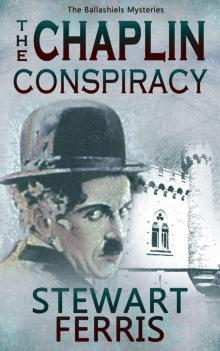- Home
- Stewart Ferris
The Dali Diaries (The Ballashiels Mysteries Book 2) Page 9
The Dali Diaries (The Ballashiels Mysteries Book 2) Read online
Page 9
‘So it might not be coming to us for a few years?’ asked Ruby.
‘Weren’t you paying attention? That painting in the cave proves that they’ve already sent their message. They sent it almost a century too early. They sent it to Dalí. It’s the only way he could have known about Keo.’
‘Why would they send the message earlier than the capsule instructed?’ asked Ruby.
‘I have no idea, but I think I’m onto something huge.’
‘If Dalí got a message from the future about Keo – which he didn’t, because it’s impossible – he probably couldn’t understand it, which is irrelevant because he didn’t receive any such message anyway, but I’m trying to see things from your skewed perspective. So you probably think in your little world of delusion that he painted all that crazy and surreal stuff, trying to interpret what he saw, becoming obsessed with immortality, and painting portals to other dimensions? Is that what you’re getting at?’
The car had now reached a junction. Ruby took the right fork to Figueres.
‘Where are you going?’ asked Rocco.
‘To the Dalí museum, of course.’
Rocco grabbed her leg, almost causing the kind of accident he had been so keen to avoid. She shook away his hand and steadied the wheel.
‘We will not go back there,’ he ordered.
‘They need to be told about the painting in the cave. They’ll have experts who can verify it better than me, and they can ensure that it’s repaired and preserved. We can’t just let it rot.’
‘The museum already knows about the painting. Trust me, Ruby. I did some research while I was hiding in that place. I found files. I hacked computers. Something is going on. I don’t know what it is, but I don’t like it.’
‘So where should we go? If you’re in as much danger as you seem to think, should you consider leaving Spain altogether? I’d be happy to drop you off in France.’
She pulled into a side road and made a three-point turn, ready to head the other way.
‘That won’t be enough,’ said Rocco in a sombre, resigned tone. ‘It’s both of us. They’ve been watching you too. We’re in too deep. They won’t rest until they have us. We can’t hide and we can’t beat them.’
‘So what are we going to do?’ asked Ruby, now sensing a growing disquiet in her stomach that threatened to develop into outright fear in spite of the calming effect of the rational side of her mind.
‘Back to your original plan. Go to the museum. Get them to think we’re on their side.’
‘Of course I’m on their side, for God’s sake,’ said Ruby. ‘I’m an archaeologist. I’m on the side of any museum.’
‘Not like this one, Ruby. This was set up by Dalí himself. He designed it. Built it in memorial to his own greatness. But someone there is rotten to the core. I don’t know if this was Dalí’s intention, but someone there is working to a higher agenda. Connected to Keo. Important enough to kill for. Driven by the future. We have to start working with them.’
The ridiculous situation was making her head spin. She was tempted to turn back to Figueres and drop her companion off at the railway station so he could get out of her life and allow her to return to normality.
‘Fine. Just make your mind up,’ she said.
‘Our only chance to find out their motives and goals, and to remove ourselves from their most-wanted list, is to infiltrate their organisation at the highest level.’
‘Just how exactly do you expect to be able to change someone’s mind from wanting to assassinate you to being your best friend?’ asked Ruby.
‘Not me. Us, remember? And it’s all part of my plan.’
‘Which is what?’
‘I’m working on it. Give me twenty-four hours to come up with something, then we’ll go see them.’
‘But since we’re going there anyway,’ said Ruby, ‘I’m going to let them know about the possible Dalí painting we found vandalised in that cave.’
‘That will not be necessary.’
‘Why not?’
‘Because I’m convinced it was someone from the museum who destroyed it.’
***
‘In this so-called country,’ explained Ratty as he swerved to correct his instincts after driving off the train at the Gallic end of the Channel Tunnel, ‘the locals drive on the wrong side of the road.’
‘One man’s wrong is also another man’s wrong,’ replied the Patient.
‘And the French eat anything that moves. Frogs. Snails. Worms.’
The Patient was no longer paying attention to Ratty’s sardonic mutterings. He was studying the other cars snaking their way out of the terminal. He suspected one of them, a black Ford Focus, had followed them from Shropshire to Folkestone, maintaining a respectful distance all the way.
‘We must not drive in the direction of Spain,’ decided the Patient.
‘Isn’t that going to make it somewhat tricky to get to Spain?’
‘We are being pursued. We must not let them know our true intentions.’
‘So what do you suggest?’
‘Drive to Belgium.’
‘Home of real chocolate. None of that Lanvin nonsense. Which way’s Belgium?’
The Patient pointed left just as Ratty turned right. They drove on in a vaguely southerly direction, quickly forgetting the Belgium plan, sticking to the Déparmentale roads which better suited the leisurely pace of the Land Rover. The sinister Ford Focus was no longer behind them. The continent opened out ahead. Beneath the patchy shadows of trees, all seemed right with the world to Ratty.
A sign indicated an imminent side turning. The rule of Priorité à Droite applied: give way to the right, slowing down to allow a waiting vehicle to join the road. A black car sat at the junction. Ratty squeezed his recently repaired brakes.
‘Curse de Gaulle and his insane proclamations of priority,’ groaned Ratty as he slowed almost to a halt. The car at the junction began to move forward.
‘Keep going,’ said the Patient. ‘It is that car again. Don’t stop.’
It was too late to accelerate, however. The engine responded to the heavy right foot with plenty of noise and very little action. The Ford now blocked their way completely. Ratty jabbed the brakes again, with equally minimal effect. The lumbering beast of the Land Rover collided with the rear of the Ford. There was no visible damage to the already battered Land Rover, but the Ford was severely dented. One of its light clusters had shattered, the bumper was cracked and hanging off, and the hatchback door was crumpled. In spite of the Patient’s suggestion that they drive off, Ratty felt it would be inappropriate not to swap insurance details. Besides, for better or worse, it would answer the question regarding the identity and intention of the driver. He turned off the engine and climbed out.
The Ford Focus driver came towards him.
‘Fancy bumping into you in France, Justin,’ said Constable Stuart.
‘Er, yes, sorry about that, officer. Bit of trouble with de Gaulle’s rules. Seems my old Landy has redesigned the rear of your runabout.’
Stuart looked at the damage to his car and shook his head.
‘I don’t know what you’re talking about, Justin. I can’t see any damage.’
‘What about the lights, and the bumper, and the dent?’
‘Nonsense. It was probably already like that.’
‘But there is a piece of your indicator lens stuck to my front bumper, constable.’
Stuart picked the plastic fragment from Ratty’s bumper and threw it onto the road.
‘No there isn’t. Now run along, and let’s not hear any more of this.’
The Patient joined them at the roadside.
‘I don’t have the capacity to work out the odds against our meeting like this on foreign soil on the same day as our encounter at that cottage this morning, but I suspect we have gone far beyond the believable realms of coincidence,’ said the Patient.
‘Can’t a village bobby take a holiday?’
‘In uniform?’ as
ked the Patient.
‘Without your lady wife?’ asked Ratty. ‘And where are you going to, anyway?’
‘Don’t you concern yourself with minor details like that. I’ll keep well out of your way. You’ll hardly know I’m here. By the way, the best route to Spain is via Rouen if you want to avoid the Paris Périphérique.’
‘But nobody knows we’re going to Spain,’ protested Ratty before he realised he might have walked into a verbal trap.
‘That’s right,’ said Stuart. ‘Nobody knows. And let’s make sure we keep it that way, shall we?’
‘Gosh, right-ho,’ said Ratty.
‘Good. Well I’ll be off then. Looking forward to my holiday immensely.’
Constable Stuart returned to his car and drove slowly away, part of his plastic bumper dragging along the road behind him. Before the road turned out of sight of Ratty and the Patient, the Ford Focus stopped. Stuart remained in the car, calmly looking in his rear-view mirror, waiting.
‘Does anything about this incident strike you as queer, Patient chappy?’
The Patient was distracted by a snail he had found close to the road. He picked it up and held it in front of his mouth.
‘This is the staple diet of a Frenchman?’ he asked.
‘No, not like that. Even Johnny Frenchman wouldn’t eat it raw.’
The Patient returned it to the ground.
‘Do you not see, Ratty? The concept of eating a gastropod mollusc is, as you say, queer, but it happens, and there is a reason for it. I can only assume that the reason is related to being in a state of imminent starvation should the snail be omitted from the dinner plate, but that isn’t important. Do you follow me?’
Ratty nodded, relieved not to have been subjected to the sight of his friend attempting to eat uncooked escargots.
‘And if culinary queerness can be explained away to a state of rationality, of normality,’ the Patient continued, ‘then surely the oddity of a Shropshire village policeman following us to France and, presumably, all the way to Spain, must have a reason too. Behind the strangeness is that hidden rationality that makes everything seem normal.’
They returned to the Land Rover and drove off. As they passed Constable Stuart, still waiting in his car, he pulled away and followed them at the same polite distance that he had maintained all the way from England.
Ratty and the Patient exchanged glances and pushed on, unsure what to think of their police escort.
‘Since we’re on the trail of Dalí and Orwell, what do you know of Orwell, old encyclopaedia?’
‘He went to Spain to fight in the civil war and was shot in the throat,’ replied the Patient with uncharacteristic brevity.
‘Right. Too tall for the trenches, I heard. Head and shoulders above his comrades. Bad show. Not good for the old G and T consumption, I shouldn’t wonder. Pour it down your throat and it leaks out all over your neck. Bally waste.’
‘The question we must ask,’ said the Patient, ‘is why an Englishman should feel motivated to fight in the war of another country.’
‘I see your point. Peculiar thing to do, but there must be a reason. And if Orwell had good cause to go to Spain and get shot in the neck, Mother must have had her reasons too. Orwell is her way of showing that abandoning me and father and dashing off to Catalonia was done for a jolly good purpose.’
Ratty paused to dislodge the lump that had just materialised in his throat. He took a couple of slow breaths before continuing.
‘She wanted me to follow her trail when I was old enough. She wanted me to find her.’
Once again, the contrary plans of his body forced him to stop speaking. There were tears to form, cold sweats to develop, and knots to tie in his stomach. It was as much as he could do to keep driving under such an emotional onslaught. The Patient waited in silence while Ratty struggled against his sentiments. A considerable while later, and with a sense that the Land Rover was being pushed to its admittedly modest upper limits of speed, Ratty managed to say, ‘Golly, I do rather hope I haven’t left it too late.’
***
Charlie looked once again at the address he had been given, but the words on the card bore no relation to the street signs, which in turn appeared completely unrelated to the roads currently showing on the satnav unit. His evening was starting to suck. Art theft was boring. He abandoned the task he had been set and drove towards Empuriabrava, hoping he could stalk Ruby for a few hours.
Seconds later he glimpsed it: the road sign indicating the address he had been sent to burgle. He pulled up outside the house and stared at it. The property was modern, minimalist, its design principles dominated by Le Corbusier but with an unsettling hint of Speer. There were large windows with no curtains, and from over the garden wall he could see immense paintings hanging in the living room, lit by a single lamp. He exited Van Gogh and crept closer to the main gates. The level of security became obvious: sensors; cameras; wires. He walked up to the iron gates and pressed the button set into one of the adjacent pillars.
A woman’s voice crackled through the intercom.
‘Hi. Speak English?’ Charlie asked.
‘Sí. I mean, yes,’ replied the woman. ‘The owner of the house is out. I am his housekeeper. Can I help you?’
‘I’ve come for the painting,’ said Charlie. ‘Am I at the right house?’
‘Yes, of course. Is this something to do with my boss?’
‘Boss? Dunno. Some old guy wants it for the museum. The Dalí dude museum.’
‘Ah, no problem. He said someone might try to take the picture for the museum tonight.’
With a buzz and a click, the gates swung majestically open. Charlie strolled up the driveway to the front door where the housekeeper was waiting. She was a few years younger than the man at the museum who had set this task for him. Her complexion was dark; her deep, shadowy features owed far more to the region’s gene pool than those of the old man. And she certainly didn’t look like the kind of person who had stolen a priceless work of art.
He showed her the postcard size print. She nodded in recognition.
‘I’ll give you a hand with it,’ she said. ‘It’s rather heavy.’
She turned off the alarm system and, with Charlie’s help, lifted the portrait from the wall and carried it to Van Gogh where it fitted comfortably upon the rear bed. Without a scratch, the artwork was ready to be returned to the museum, and nothing had been damaged at the house. Charlie had managed to do something right.
He drove back to Figueres with his proud booty and phoned the old man to come and meet him on the street beside the museum. When the old man stepped outside and inspected Charlie’s booty he showed no evidence of pleasure or gratitude, but Charlie was grateful nevertheless for the absence of anger.
Charlie followed the old man back inside. This time he was led upstairs to an office. On the door was a modest aluminium sign that read ‘Director’. The old man ushered Charlie into the room. It was furnished with a large desk, a leather swivel chair, a filing cabinet and a meeting table. There was no hint of any association with Dalí. No artwork, sculptures or books that would connect this ‘director’ to the museum below. It was as if the old man had a different agenda from the stewardship of surrealist paintings.
Another man was present in the room, sitting at the meeting table and holding an envelope. His chubby middle-aged figure was squeezed into an expensive suit that must have been made for someone else and the stubble atop his shaven head glistened with an oily hue. Charlie felt a sickening sense that this was how he might end up looking in later life if he didn’t start taking care of himself. The portly stranger nodded a greeting, squeezing his double chin out to the sides like a balloon as he did so. Charlie reached out to shake his hand, but found instead that the envelope was forced into his palm.
‘This is Grant,’ said the old man. ‘He is one of my people. He has been preparing everything you will need.’
Again, Charlie succumbed to a fascination with the old man’s accent
. It was as if he was not the product of any country. The voice belonged nowhere. The old man spoke with an undertone of tragedy, like a lost soul, abandoned by the world.
‘Everything I need, huh?’ asked Charlie. ‘Need for what?’
‘Everything you need for your mission, sir,’ said Grant in a clipped and elegant voice that surprised Charlie because it seemed to carry an undertone of menace just beneath surface of the rounded English vowels. Charlie eyed Grant cautiously and squeezed the envelope. It felt bulky.
‘My mission?’ He wondered how these guys could have known about his plan to visit every European branch of Dunkin’ Donuts.
‘Take a seat, sir,’ said Grant, pulling out a chair for Charlie.
‘Grant has left nothing to chance,’ said the old man. ‘He has done well to assemble these things at such short notice. Open it.’
Charlie made himself comfortable on the chair before ripping open the envelope and sprinkling the contents onto the table.
‘First class travel documents. False passport. American money. It’s all there, sir,’ said Grant.
‘First class, huh?’
‘Yes. You will feel more refreshed upon arrival, sir.’
‘They do donuts in first?’
Grant ignored the question and fanned through the banknotes.
‘Sixty thousand dollars, sir. We can drop off more if you need it.’
Charlie’s face lit up. He began spending the cash in his head immediately and became so engrossed in his fantasies that he scarcely noticed when the old man dismissed his assistant. Grant nodded, left the room, and closed the door behind him. When Charlie’s mind had filled to overflowing with the fabulous consumer goods he was going to buy with the money, he smiled with satisfaction and asked his next question.
‘Where am I supposed to go?’
‘New York,’ came the old man’s reply. ‘You fly this evening.’
‘To do what?’
‘Listen very carefully. This is important.’
‘Important, huh?’
‘Yes, and you are not listening.’

 The Chaplin Conspiracy
The Chaplin Conspiracy The Sphinx Scrolls
The Sphinx Scrolls The Little Book of Flirting
The Little Book of Flirting The Genesis Glitch
The Genesis Glitch The Dali Diaries (The Ballashiels Mysteries Book 2)
The Dali Diaries (The Ballashiels Mysteries Book 2)